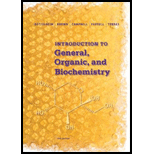
Introduction to General, Organic and Biochemistry
11th Edition
ISBN: 9781285869759
Author: Frederick A. Bettelheim, William H. Brown, Mary K. Campbell, Shawn O. Farrell, Omar Torres
Publisher: Cengage Learning
expand_more
expand_more
format_list_bulleted
Question
Chapter 24, Problem 24.94P
Interpretation Introduction
Interpretation:
Determine the usefulness of availability different classes of neurotransmitters and hormones.
Concept Introduction:
Chemical messenger is any chemical which is released and travels from one location to other before acting. They interact with the receptors and operate between the cells. The hormones and the neurotransmitters both are a type of chemical messenger.
Expert Solution & Answer
Want to see the full answer?
Check out a sample textbook solution
Chapter 24 Solutions
Introduction to General, Organic and Biochemistry
Ch. 24.5 - Problem 24-1 What is the functional difference...Ch. 24 - 24-2 What kind of signal travels along the axon Of...Ch. 24 - Prob. 24.3PCh. 24 - Prob. 24.4PCh. 24 - Prob. 24.5PCh. 24 - Prob. 24.6PCh. 24 - Prob. 24.7PCh. 24 - Prob. 24.8PCh. 24 - Prob. 24.9PCh. 24 - 24-10 Which end of the acetylcholine molecule fits...
Ch. 24 - Prob. 24.11PCh. 24 - Prob. 24.12PCh. 24 - Prob. 24.13PCh. 24 - Prob. 24.14PCh. 24 - Prob. 24.15PCh. 24 - 24-16 List two features by which taurine differs...Ch. 24 - Prob. 24.17PCh. 24 - 24-18 What is unique in the structure Of GABA that...Ch. 24 - Prob. 24.19PCh. 24 - Prob. 24.20PCh. 24 - Prob. 24.21PCh. 24 - 24-22 How is the catalytic unit of protein kinase...Ch. 24 - Prob. 24.23PCh. 24 - Prob. 24.24PCh. 24 - Prob. 24.25PCh. 24 - Prob. 24.26PCh. 24 - Prob. 24.27PCh. 24 - Prob. 24.28PCh. 24 - Prob. 24.29PCh. 24 - Prob. 24.30PCh. 24 - Prob. 24.31PCh. 24 - Prob. 24.32PCh. 24 - Prob. 24.33PCh. 24 - Prob. 24.34PCh. 24 - Prob. 24.35PCh. 24 - Prob. 24.36PCh. 24 - Prob. 24.37PCh. 24 - Prob. 24.38PCh. 24 - Prob. 24.39PCh. 24 - Prob. 24.40PCh. 24 - 24-41 Describe the signaling pathway involving...Ch. 24 - 24-42 Does insulin use a G-protein signaling...Ch. 24 - Prob. 24.43PCh. 24 - Prob. 24.44PCh. 24 - Prob. 24.45PCh. 24 - 24-46 Do steroid hormones always bind directly to...Ch. 24 - Prob. 24.47PCh. 24 - Prob. 24.48PCh. 24 - Prob. 24.49PCh. 24 - Prob. 24.50PCh. 24 - Prob. 24.51PCh. 24 - Prob. 24.52PCh. 24 - Prob. 24.53PCh. 24 - Prob. 24.54PCh. 24 - Prob. 24.55PCh. 24 - Prob. 24.56PCh. 24 - Prob. 24.57PCh. 24 - Prob. 24.58PCh. 24 - Prob. 24.59PCh. 24 - Prob. 24.60PCh. 24 - 24-61 (Chemical Connections 24C) What are the...Ch. 24 - Prob. 24.62PCh. 24 - Prob. 24.63PCh. 24 - Prob. 24.64PCh. 24 - Prob. 24.65PCh. 24 - Prob. 24.66PCh. 24 - Prob. 24.67PCh. 24 - Prob. 24.68PCh. 24 - Prob. 24.69PCh. 24 - Prob. 24.70PCh. 24 - Prob. 24.71PCh. 24 - Prob. 24.72PCh. 24 - Prob. 24.73PCh. 24 - Prob. 24.74PCh. 24 - Prob. 24.75PCh. 24 - Prob. 24.76PCh. 24 - Prob. 24.77PCh. 24 - Prob. 24.78PCh. 24 - Prob. 24.79PCh. 24 - 24-80 (Chemical Connections 24G) What makes...Ch. 24 - Prob. 24.81PCh. 24 - Prob. 24.82PCh. 24 - Prob. 24.83PCh. 24 - Prob. 24.84PCh. 24 - Prob. 24.85PCh. 24 - Prob. 24.86PCh. 24 - Prob. 24.87PCh. 24 - Prob. 24.88PCh. 24 - Prob. 24.89PCh. 24 - Prob. 24.90PCh. 24 - Prob. 24.91PCh. 24 - Prob. 24.92PCh. 24 - 24-93 Why are receptors proteins, rather than any...Ch. 24 - Prob. 24.94PCh. 24 - 24-95 What relationship do adrenergic messengers...Ch. 24 - 24-96 What functional groups are found in the...Ch. 24 - Prob. 24.97PCh. 24 - Prob. 24.98PCh. 24 - Prob. 24.99PCh. 24 - Prob. 24.100PCh. 24 - Prob. 24.101PCh. 24 - Prob. 24.102PCh. 24 - Prob. 24.103PCh. 24 - Prob. 24.104P
Knowledge Booster
Similar questions
- 24-96 What functional groups are found in the structures Of chemical messengers? What do these structural features imply about the active sites of the enzymes that process these messengers?arrow_forward24-80 (Chemical Connections 24G) What makes ketamine an attractive prospect for an antidepressant?arrow_forward24-93 Why are receptors proteins, rather than any Other kind of molecule?arrow_forward
arrow_back_ios
arrow_forward_ios
Recommended textbooks for you
 Introduction to General, Organic and BiochemistryChemistryISBN:9781285869759Author:Frederick A. Bettelheim, William H. Brown, Mary K. Campbell, Shawn O. Farrell, Omar TorresPublisher:Cengage Learning
Introduction to General, Organic and BiochemistryChemistryISBN:9781285869759Author:Frederick A. Bettelheim, William H. Brown, Mary K. Campbell, Shawn O. Farrell, Omar TorresPublisher:Cengage Learning

Introduction to General, Organic and Biochemistry
Chemistry
ISBN:9781285869759
Author:Frederick A. Bettelheim, William H. Brown, Mary K. Campbell, Shawn O. Farrell, Omar Torres
Publisher:Cengage Learning